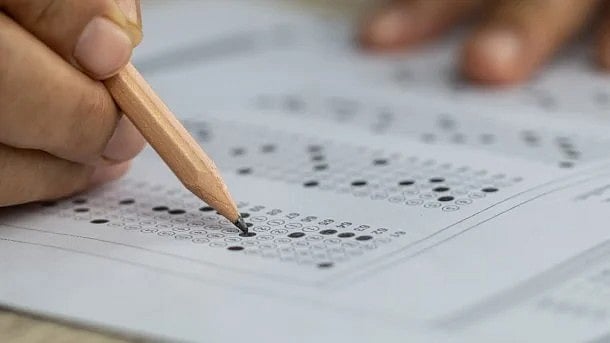
Representative image of a candidate appearing for exams.
Credit: iStock Photo
The Central Board of Secondary Education’s (CBSE) plan to introduce open-book examinations (OBEs) for Class IX from 2026–27 is more than symbolic; it signals a serious attempt to reform assessment. On the surface, the sight of students carrying textbooks into an exam hall may seem radical.
More importantly, the idea represents a break from the rote memorisation that has long dominated classrooms. Essentially, the shift recognises that learning in an age of instant access to information should be judged by how well students interpret, apply, and synthesise knowledge, not by how much they can recall under pressure.
For too long, India’s exam system has emphasised recall and reproduction of facts, rewarding speed and memory over thoughtfulness and understanding. As decades of research in educational psychology show, this method fosters only surface learning, leaving students ill-prepared for complex real-world situations or the demands of higher education.
OBEs offer a profound alternative. By allowing access to resources, they encourage students to analyse concepts, compare perspectives, and formulate arguments rooted in evidence. These exams demand higher-order thinking, creativity, and the ability to tackle unfamiliar problems—skills far more relevant to contemporary life and work than rote recall.
The benefits of OBEs go beyond cognitive gains. High-stakes, memory-driven exams in India are notorious for generating stress and anxiety, sometimes with tragic outcomes. Reimagining exams as platforms for interpretation and application offers students greater fairness.
Learners with strengths in reasoning, creativity, or interdisciplinary thinking often feel penalised by memory-centric tests. OBEs open the door for them to succeed by leveraging those very capabilities. Modern employers no longer value memorisation; they seek adaptable employees who can solve problems and synthesise information from diverse sources—qualities that OBEs are better positioned to nurture.
However, CBSE’s past experiments with OBEs call for a cautious approach. Open-text-based assessments introduced in 2014 were phased out by 2017–18, after reviews revealed familiar problems. Students and teachers were unprepared, classroom practices barely changed, and resource gaps widened divides between privileged and under-resourced schools.
Pilot studies conducted in 2023 painted a similar picture, with average scores between 12% and 47% suggesting foundational skills such as independent reading and critical reasoning remain limited because classrooms have yet to nurture them systematically. A rushed rollout of OBEs, therefore, could frustrate students, burden teachers, and deepen inequalities.
The success of OBEs depends on treating implementation as a substantive reform, not just a procedural adjustment. Teacher preparation is central. OBEs require teachers to frame open-ended questions, assess the quality of arguments rather than recall, and provide constructive feedback to guide deeper thinking. This represents a significant departure from traditional approaches and will necessitate substantial professional development, ongoing mentorship, and access to international best practices.
School authorities must create sustained opportunities for teachers to learn, experiment, and share experiences. Simultaneously, the culture of classroom learning must evolve. Genuine adoption of resource-based learning means encouraging students to consult multiple sources, debate interpretations, and apply knowledge to real-world issues. This is not a short-term fix, but rather a gradual transformation that demands patience, leadership, and a willingness to learn from setbacks.
Making it inclusive
In all this, let us not forget equity, which is paramount. Many government and rural schools still lack basics: libraries, digital resources, and adequately trained teachers. If OBE is rolled out without addressing these realities, it may become another privilege for better-off urban students.
CBSE and state authorities must tie OBE implementation to targeted investments in infrastructure and digital inclusion. Pilot programmes should intentionally include under-resourced schools so that feedback reflects diverse realities. Without this, OBEs could reinforce, rather than reduce, inequalities.
Clear communication is equally important. In a society where marks function as gateways to careers, any exam reform risks being misunderstood—as dilution of standards or a shortcut to success. Educators must clarify that OBEs are not easier but more meaningful assessments.
They are also better aligned with higher education, where research papers, case analyses, and projects dominate. By connecting school assessments to these practices, OBEs can smooth the transition to university and help students build transferable skills.
Ultimately, what is at stake is the culture of learning itself. If thoughtfully designed and methodically implemented, OBEs can move Indian classrooms from rote drills to environments rich in questioning, imagination, and reasoning. Past failures underline the need for preparation and the courage to learn from mistakes, not to abandon reform.
With substantial investment in teacher training, genuine commitment to equity, and feedback-driven rollout, OBEs can reshape assessments and how Indian society perceives knowledge. If implemented with care, OBEs can help India take a decisive step toward a future where schools value wisdom and insight over recall and repetition, giving generations of students the foundation for meaningful lifelong learning.
(The author is a former professor and dean of a university in Bengaluru)